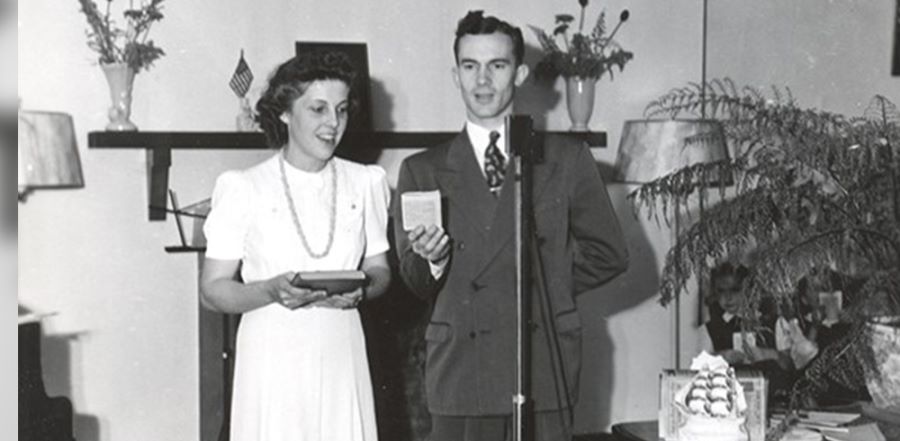Click to join the conversation with over 500,000 Pentecostal believers and scholars
Click to get our FREE MOBILE APP and stay connected
| PentecostalTheology.com




This Week in AG History — December 29, 1963
By Ruthie Edgerly Oberg
Originally published on AG News, 29 December 2022
“From the Middle Ages to modern times there have been many instances of discrimination, persecution, and even atrocities committed against the Jews by so-called Christians or Christian nations.” This opening statement of Richard W. Bishop’s article “How A True Christian Regards the Jews” in the Dec. 29, 1963, issue of the Pentecostal Evangel sets the course for his defense of the Assemblies of God historical position on antisemitism.
Antisemitism (a prejudice and/or discrimination against Jews as individuals and as a group) has played a part in the relationship between Christianity and Judaism since the early days of the Christian movement. Initially, Christianity was viewed as a Jewish sect; but as more Gentiles converted, including the Roman emperors, Christianity became the dominant religion of the empire. Many of the Early Church fathers, with the acceptance of Jesus Christ as Messiah, saw the purposes of Judaism as being fulfilled in Christ.
During the Middle Ages a pattern of discrimination crept into Christian society. Various localities passed laws prohibiting Jews from holding government positions, serving as court witnesses, or marrying Christians. Beginning in the 11th century, the Crusades had a direct impact on the Jewish/Christian relationship, as thousands of Jewish communities experienced looting, rape, and murder at the hands of Christian soldiers. During the 14th century outbreak of Bubonic Plague, Jews were accused of poisoning the water sources of Christian villages and an estimated 100,000 Jews were murdered as retaliation. In some European cities they were herded into ghettos and forced to wear a distinctive symbol on their clothing to mark their racial identity.
In 1903, Russian secret police published a forged document, “The Protocols of the Elders of Zion,” purporting to expose a Jewish conspiracy for world domination. This was exposed as a forgery in 1921, but not before many people embraced its contents. Alongside such documents, the rise of social Darwinism led to the increase of belief in the superiority of some races and the inferiority of others.
After the Holocaust of World War II, the real-life consequences of antisemitism were made clear to many Christians. In 1945, the General Council of the Assemblies of God passed the following resolution: “WHEREAS, We have witnessed in this generation an almost universal increase in antisemitism and this has resulted in the greatest series of persecutions perpetrated in modern times, and WHEREAS, Even in the United States of America there has been an alarming increase in antisemitism; THEREFORE BE IT RESOLVED, That the General Council hereby declare its opposition to antisemitism and that it disapproves of the ministers of the Assemblies of God identifying themselves with those who are engaged in this propaganda.”
When Bishop, at that time serving as pastor of Calvary Temple in Chicago, published his article in 1963, there had been several recent reports of antisemitism in the newspapers. Bishop posed the question to Evangel readers, “Have these acts been committed by true Christians?” He answered his own question with “an emphatic No!”
Bishop, reflecting the position of the Assemblies of God, outlined three attitudes that mark a true Christian toward the Jewish people. The first is a sense of gratitude. “Christians are indebted to the Jews for both the Old and the New Testament … [and] also [for] their Savior.” He also counted a debt owed to the “dedicated Jews who brought the Christian message to the Gentiles and not the other way around.”
The second attitude should be a sense of kinship. “Jews and Christians have much in common … Both acknowledge the same God. Both accept the Old Testament … Both emphasize love for God and for one’s neighbor …Both expect the Messiah … There is not to be one Messiah for the Jews and another for the Gentiles.”
Bishop says a third attitude must be one of a sense of deep concern. “The desire and prayer to God for Israel is that they might be saved. This is the desire of every genuine believer … For there is no difference between the Jew and the Greek (or Gentile); for the same Lord over all is rich unto all that call upon him.”
Bishop, who later went on to teach Bible, history, and homiletics at Northwest Bible college in Kirkland, Washington, and finished his career as professor of practical theology at the Assemblies of God Theological Seminary in Springfield, Missouri, argued that these attitudes must be the response of every true believer in Christ. “There is a radical difference between a true believer and one who is a Christian only in name or by profession … a real Christian manifests love for all men. He loves the Jewish people and prays for their welfare.”
Last month the Assemblies of God released a statement again condemning antisemitism in all forms.
Read the article, “How a True Christian Regards the Jews,” on page 12 of the Dec 29, 1963, issue of the Pentecostal Evangel.
Also featured in this issue:
• “New Power for the New Year” by Hardy Steinberg
• “A Crack in the Walls” by Delmar Guynes
• “Prayer Brings Revival to Lagos” by Robert Webb
And many more!
Click here to read this issue now.
Pentecostal Evangel archived editions courtesy of the Flower Pentecostal Heritage Center.
Do you have Pentecostal historical materials that should be preserved? Please consider depositing these materials at the Flower Pentecostal Heritage Center (FPHC). The FPHC, located in the Assemblies of God national offices, is the largest Pentecostal archive in the world. We would like to preserve and make your treasures accessible to those who write the history books.
Flower Pentecostal Heritage Center
1445 North Boonville Avenue
Springfield, Missouri 65802 USA
Phone: 417.862.1447 ext. 4400
Toll Free: 877.840.5200
Email: archives@ag.org
Website: www.iFPHC.org




Most Talked About Today